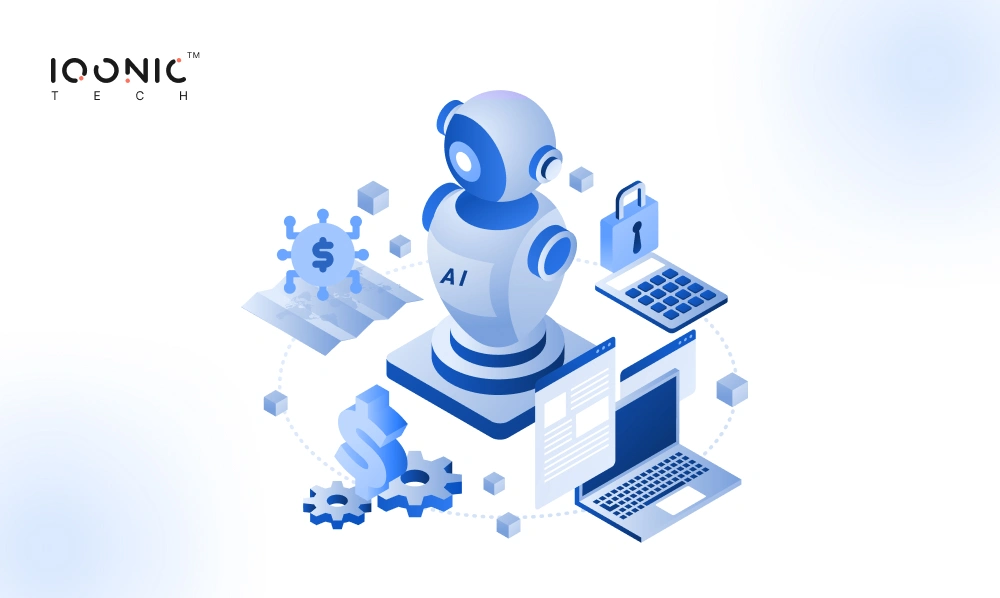Artificial Intelligence (AI) is no longer a futuristic concept; it is a present-day reality reshaping industries worldwide. Among these, the financial technology (fintech) sector stands out as one of the biggest beneficiaries of AI-driven innovation. From fraud detection to personalized customer experiences and automated trading systems, AI’s impact on financial services is transformative. But why is AI so critical for fintech? And how can businesses leverage this technology to gain a competitive edge? In this blog, we’ll explore how AI in Fintech is revolutionizing the industry, its benefits, challenges, and actionable insights for IT professionals and businesses alike.
How AI is Revolutionizing Financial Services

1. Fraud Detection and Risk Management
AI has redefined fraud detection in financial services by automating processes once reliant on human intervention. Machine learning algorithms can analyze vast amounts of transactional data in real-time to detect unusual patterns indicative of fraud. For example, companies like PayPal and Stripe use AI in Fintech to monitor millions of transactions daily, flagging potential fraud before it impacts customers or businesses. This level of automation significantly reduces false positives that were once common with rule-based systems, improving accuracy and decision-making.
2. Personalized Customer Experiences
Customer expectations in financial services have evolved, and AI is enabling fintech companies to meet these demands. With advanced data analytics and natural language processing (NLP), AI can deliver hyper-personalized services. Chatbot solutions powered by AI, like those offered by banks such as Bank of America with their Erica system, provide instant, tailored financial advice based on individual customer needs. This not only enhances user satisfaction but also reduces the operational burden on customer service teams.
3. Automated Trading and Investment Advisory
Through AI-driven algorithms, complex market patterns and trends can be analyzed in seconds, empowering investment platforms to automate trading decisions. Tools like robo-advisors leverage AI to manage customer portfolios efficiently. Popular platforms such as Wealthfront and Betterment offer automated investment options based on user-defined goals and risk tolerance, making investment management more accessible and data-driven.
Benefits and Importance of AI in Fintech

a. Efficiency and Cost Savings
AI in Fintech streamlines manual processes, enabling organizations to process transactions, handle customer queries, and manage backend operations much faster. This increased efficiency leads to significant cost savings by reducing the need for large human workforces and minimizing operational overhead.
b. Improved Decision-Making Capabilities
AI provides deep insights into user behavior and market trends, helping financial organizations make data-backed decisions. Predictive analytics allows businesses to anticipate customer behaviors, market changes, and even economic shifts more effectively.
c. Scalability and Accessibility
AI-powered fintech solutions can scale rapidly without compromising performance. This scalability supports businesses catering to a growing global customer base. Furthermore, AI tools like robo-advisors have made financial services more accessible, reducing entry barriers for individuals who may have felt excluded from traditional financial systems.
Challenges and Misconceptions
i. AI is Too Costly for Small Businesses
One common misconception is that AI technologies are prohibitively expensive for small and medium businesses (SMBs). While it’s true that implementing AI can involve upfront costs, SaaS platforms and cloud-based AI services have made it more accessible even for smaller organizations. Businesses can start by integrating specific, use-case-driven AI solutions rather than overhauling their entire operation.
ii. AI Will Replace Humans in Financial Services
The narrative that AI will entirely replace humans is overblown. Instead of replacing jobs, AI augments human capabilities by automating repetitive tasks and enabling professionals to focus on strategic decision-making, complex problem-solving, and creative solutions. AI systems function best when paired with human oversight and expertise.
iii. Data Privacy Concerns
As AI relies on massive datasets to operate effectively, concerns about data privacy and security are valid. However, businesses can address this by prioritizing compliance with regulations like GDPR and adopting robust encryption practices to safeguard sensitive data. By being transparent with users about how their data is being used, fintech companies can build trust and ensure ethical AI usage.
Practical Tips to Leverage AI in Fintech
a. Start Small and Focused
Businesses should begin their AI journey with a specific problem or process to address. For instance, implementing AI-driven chatbots to handle customer service queries is a manageable starting point that delivers immediate value.
2. Collaborate with Technology Providers
Partnering with experienced AI vendors can accelerate implementation while ensuring that the AI-powered fintech solutions are well-suited to your business needs. Platforms like Google Cloud AI or IBM Watson’s financial tools provide scalable, customizable solutions.
3. Invest in Employee Training
To maximize the benefits of AI, businesses should invest in training their workforce. Employees who understand how AI systems work and how they can complement organizational goals are better equipped to leverage its potential fully.
4. Focus on Security and Compliance
When adopting AI, prioritize solutions that adhere to industry standards for security and compliance. Regular audits and employing privacy-enhancing technologies can help businesses mitigate risks associated with data handling.
Conclusion
The integration of AI into fintech is not merely a competitive advantage; it’s becoming a necessity in today’s fast-paced digital landscape. From transforming fraud detection and personalizing customer experiences to automating trading and investment decisions, AI in Fintech is revolutionizing every corner of financial services. While challenges like data privacy and misconceptions about costs exist, businesses equipped with the right knowledge can navigate them effectively.
Now is the time for IT professionals and businesses to explore AI in Fintech and its transformative potential. Start embracing small-scale AI solutions, collaborate with trusted technology providers, and prioritize education on both the technical and ethical aspects of AI. By doing so, you’ll not only stay ahead of the curve but also deliver meaningful value to your customers in an increasingly AI-driven world.





